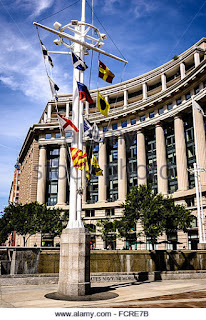We lived inside the Beltway from June of 1988 till August of 1992. My wife was determined that we would get the full immersion experience of Washington, D.C. I once began a sermon with "There went out a decree from Susan Augustus" that we would attend the lighting the National Christmas Tree.
On Veteran's Day, 1988, the church was closed but school was open, so the two of us decided to drive into the city. On the way we heard on the radio that President Reagan would be speaking at amphitheater at Arlington, and we decided go. It was a very short (his main speech was at the Vietnam Memorial) but vintage Reagan speech complete with Nancy looking on in her adoring way. An experience we are happy we had.
On Veteran's Day, 1988, the church was closed but school was open, so the two of us decided to drive into the city. On the way we heard on the radio that President Reagan would be speaking at amphitheater at Arlington, and we decided go. It was a very short (his main speech was at the Vietnam Memorial) but vintage Reagan speech complete with Nancy looking on in her adoring way. An experience we are happy we had.
 |
| Reagan at Arlington (Probably 1985) |
There were great many other experiences - all the museums and monuments, the National Cathedral, concerts of military bands on the Capitol steps on summer evenings, tours of the White House, Evening Parade at the Marine Barracks, the cherry blossoms, Fourth of July Concerts on the Capitol lawn, Food Court at Union Station,a series of Marine Band Concerts at Constitution Hall, lunch at the American Cafe on Capitol Hill, Messiah at the Kennedy Center.
The memory that comes to mind on this Inauguration Day is the 1989 Inauguration of George H.W. Bush. Again Susan found out there would be a concert at the Lincoln Memorial. (I was surprised that Donald Trump did not know there had been a concert on Inauguration eve there before.) The other day I opened a drawer in a desk and found a small flashlight. All of us received one as we arrived at the Memorial as tokens of the Bush theme - "A Thousand Points of Light." I remember only two acts - Gloria Estefan and the Miami Sound Machine and the Beach Boys. My favorite memory of the Concert is of our youngest son, Joel, then 5 years old, sitting on my shoulders and singing at the top of his off key voice, "Aruba, Jamaica, ooh I wanna take ya..."
The next morning we caught the subway into the city. When we arrived we claimed a spot on the street in front of the Navy Memorial. Of course, there were hours left till the Inauguration itself, but, if my memory is correct, we managed passing the time without family crisis and without a meltdown on the part of any of the five boys or dad. Susan has always been the glue (by calmness, resilience, and organization) that holds our family together, and the Inauguration was no exception.
The twins had got a battery operated TV with a very small screen for Christmas, and much of the time was spent watching TV on the curb. It was on that TV we witnessed the Inauguration itself. Not too long afterward we watched as a giant helicopter carrying the Reagans to Andrews for their flight to California flew over our heads. Eventually the "entertainment" began, and we watched as band after band passed before us. We saw the the Bushes darkly as through a tinted glass waving as their limousine made its way to the White House the the reviewing stand.
 |
| Navy Memorial |
At last the sun began to go down, the temperature began to drop, and the Queen said that we could go home. We made it home in time for those who wished to watch the end of the parade and then the Inaugural festivities. The boys were nowhere to be found.
We lived in Washington at the right time. (We moved to Pittsburgh in August of 1992.) Susan always said she was glad we got out of town before "those people" moved into the White House.
We lived in Washington at the right time. (We moved to Pittsburgh in August of 1992.) Susan always said she was glad we got out of town before "those people" moved into the White House.








